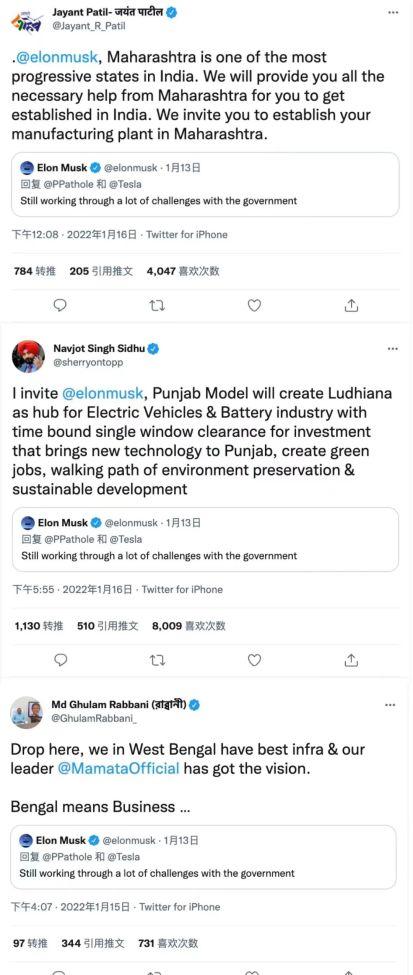Can "Made in India" force Tesla to set up factories in the region?
Text/Shanshan Xu
Whether in the United States, Europe, or China's pure electric vehicle market, Tesla is a well-deserved sales champion. For the full year of 2021, Tesla delivered more than 936,000 electric vehicles worldwide. But so far, Musk's ambitions have been blocked from the Indian market.
The Tesla helmsman has repeatedly tweeted complaining that India's import tariffs are among the highest in the world. This is an important reason why Tesla has not been able to conquer the Indian market so far. However, in recent days, the leaders of India's four states and political parties have thrown an olive branch to Musk, inviting the latter to build a car factory in the state where he is located.
The screenshot is from the Indian Express report
Musk's "temperament"
Back in early January 2021, Tesla had registered a subsidiary in Bangalore, India. The company is believed to have been looking to recruit executives in India. For the Indian market, Tesla obviously has already calculated.
Tesla was allowed to launch 7 electric vehicles in India last year, but "the poor are falling into the yellow spring", and it is difficult to find any tesla in the Indian market.
Tesla CEO Musk has repeatedly explained this: "India's tariffs are too high! Musk has tweeted that the Indian government has lowered import tariffs.
According to reuters earlier news, the Indian government is considering reducing the import tariff on electric vehicles worth less than $40,000 from 60% to 40% of the current implementation; while the import tariff on electric vehicles above $40,000 will be reduced from 100% to 60%. But more than half a year has passed, and India has not yet introduced new tariff measures.
In the face of netizens' questions, Musk had to tell the truth, "Still working with the Indian government to solve many challenges." ”
In addition to the import tariff issue that Musk has mentioned many times, it is not an easy task to set up a factory in India. On the one hand, for a long-term investment, the site selection of the factory is very critical, and secondly, the appropriate production conditions, technical personnel, etc. are just needed; on the other hand, whether India can solve Tesla's local production capacity is related to the operation of the latter. Although India is the world's fifth-largest automotive market, the electric vehicle market is not yet fully exploited, and bicycles generally sell for less than $20,000.
However, interestingly, after the tweet was released, a number of local state and political party leaders in India replied to Musk, inviting Tesla to build a factory in the local area.
Euphemistic "persuasion" to set up a factory?
Jayant Patil, Minister of Water Resources and CAD of the Maharashtra Government of India, said, "Maharashtra is one of the leading industrial states in India. We will provide Tesla with all the necessary assistance in building a factory in the local area. ”
Navjot Singh Sidhu, chairman of the Punjab Parliament, said Punjab would turn Ludhiana, the largest city in Punjab, into a hub for the electric vehicle and battery industry. West Bengal Minister Md Ghulam Rabbani then tweeted, "Build the factory in West Bengal, where the best infrastructure is available, and a visionary leader." ”

Not long ago, the minister of the Indian state of Telangana, K T Rama Rao, also issued an invitation to Tesla, hoping that the latter would build a factory in the local area.
Shutting down the import tariffs, the heads of India's states are keeping a close eye on the investment trends of the world's largest electric vehicle manufacturer.
In the final analysis, what India wants is not just Tesla to enter the Indian market, but to effectively land the factory in India, create jobs, promote the "Made in India" strategy, and on this basis, stimulate the economic growth and export value of the state where the factory is located.
In 2014, Indian Prime Minister Narendra Modi launched the "Make in India" initiative, announcing that he would build India into a global manufacturing hub. To this day, India is pushing ahead with this ambitious plan. Taking a step back, if the import tariffs on electric vehicles are not reduced, Tesla may only have to choose a factory to conquer the Indian electric vehicle market.
India plans to achieve net zero emissions by 2070, but the current popularity of electric vehicles is still limited by price factors. Considering that Tesla is mainly focused on the mid-to-high-end market, while Indian consumers are more price-sensitive, the larger reason for its active introduction is aimed at developing local manufacturing.
Far from the demand side of the factory construction plan, tesla will really continue?
Write at the end
In the field of electric vehicles, Tesla is undoubtedly a piece of "fragrant food". As early as 2017, the Shanghai government allowed Tesla to wholly own the construction of a production base to open up the Chinese market. This is unprecedented in the industry.
However, the Indian government is hesitant to give Tesla the "green light". The Indian Express quoted sources as saying that India's Ministry of Heavy Industry is worried that other companies may follow Tesla's lead in seeking government concessions. In addition, if India gives Tesla a tariff concession that satisfies Tesla, it will be unfair to companies that have already made huge investments in India.
All in all, Tesla may have a headache for a long time when it comes to Indian import tariffs. As for whether there will be a factory in India, it is all a matter of later.